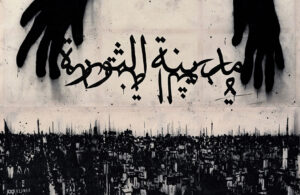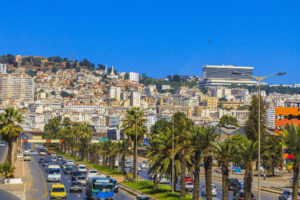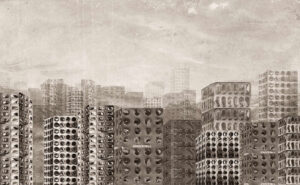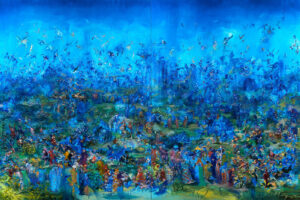Select Other Languages French.
A discussion of the new art film A Bunch of Questions With No Answers (2025) by Alex Reynolds and Robert M. Ochshorn.
At a time when journalism is increasing under attack — and not just from the Netanyahu and Trump administrations — legacy journalism has become untrustworthy, particularly among activists for Palestine. The failure of the mainstream media such as the BBC, CNN, and the New York Times, among many others, to adequately cover the war on Gaza and address the ongoing genocide and the onset of mass famine, has forced many to get their news from elsewhere. So who’s to blame: the stranglehold of Israel’s hasbara and military industrial complex on western governments? A lack of interest by the journalists themselves? Some believe we are witnessing compromise, co-option, and corruption in, allegedly, one pillar of democracy, a free press and how it reports and disseminates the news.
A new art film/documentary is A Bunch of Questions With No Answers by Alex Reynolds and Robert M. Ochshorn. Majestically long, it covers 23 hours inside the US State Department press briefings, from the 3rd of October, 2023 to the end of the Biden administration. The questions by journalists to US State Department officials about the genocide in Gaza provide the film’s drama, intrigue, and at times incredulity. The filmmakers edited out the evasion, lack of clarity, and subterfuge on the part of administration officials.
Bafta-nominated film producer and curator Elhum Shakifer has seen A Bunch of Questions in three sittings. “The film centers the questions. Vacuous responses by the US State Department representatives are edited out, so that you only see their faces: listening or poised to respond/evade, with a range of blank stares, nervous tics, sly smiles, something akin to helplessness, mirth. It is haunting.”
She continues, “Day after day, [the journalists] show up to ask, state, remind. As the violence rages on, their questions become more detailed, underlining that asking in this context ensures that facts are on record. Palestinian journalist and Washington bureau chief of Al Quds, Said Arikat, is particularly compelling and moving — on point, eloquent, unrelenting — present at every single press briefing.” A reason for the reporters’ insistence, she believes, is that they “are conscious that they are colleagues of the 230 plus journalists who have been killed in Gaza since the beginning of the genocide.”
A Bunch of Questions with No Answers poses new questions about the highly technical nature of today’s filmmaking, as Robert M. Ochshorn explains in the interview below. However the philosophical choices in the film for Alex Reynolds come not from algorithms but Spinoza.

Malu Halasa: For many people, there’s been a disconnect between watching what’s going on in Gaza almost in real time on social media, and what the news has been telling us, or the type of headline news stories. Was this one of the main motivations behind the film?
Alex Reynolds: Definitely. Ryan Grim from Drop Site News was saying that if we only had access to the [US State Department] pressroom, you’d see an adversarial press. So it was somehow hopeful to be watching that room and seeing a group of journalists actually doing their job and [being] super-informed about what was happening and giving a lot of historical context as well within their questions. And that was indeed being cut or not reaching the general news that we were reading elsewhere. So in a way, our intention was to make that room the news. Because that’s where the news was actually happening, or we felt that’s where it wasn’t being censored or cut. So it was good to focus our attention on that space and make it public, to skip the censorship and the editorial cuts that were happening at places like the BBC, CNN, and in many other media across the board.
TMR: There were terms and sources that the reporters referred to, whether we’re talking about statements from Democracy in the Arab world, the organization started by the murdered Saudi journalist Jamal Khashoggi, or intelligence reports by the Israelis — sources that we didn’t hear about, or even know existed. Perhaps if you were trawling the internet and looking for those sources you could have found them. However, the journalists in the film knew those sources, they were all reading them, or if they weren’t, they were consulting similar sources, and they outlined these sources in their questions. This was the information or backstory to which we, the public, were not privy. Did the wide variety of sources cited in the film surprise you?
AR: I remember watching the ICJ court trial of South Africa with a group of friends. We were very surprised that a lot of the things that were being presented as evidence were things we were already aware of through social media and through Palestinian journalists on the ground in Gaza. But none of that information was actually coming through newspapers. So indeed, I think a lot of the info that the journalists have is available if you’re tapped into the right channels, but they’re not the mainstream channels.
TMR: What were the influences that shaped the film, the length of it, and the way that you decided to edit out the answers of the administration.
Robert M. Ochshorn: We started this project very unsure on what kind of form it would take, and it’s taken a few different forms for some time. It operated as a very small newsletter that would go from the day’s news briefing automatically to an email for people to see. [It was] almost like a different way of getting your news straight from the reporting questions of these journalists.
TMR: How many people received your newsletter?
RMO: It was very small. Just, you know, a dozen people, as we were experimenting with the project.
AR: Then the US administration changed, and we decided to get rid of the newsletter altogether.
RMO: It was in this moment, just after Trump started his regime, and there was a temporary ceasefire. We were actually feeling a lot of despair about how Gaza and Palestine were not in the news anymore. The duration [of the film] came out of that sense of dread that atrocities were being perpetrated silently. We know that has been a strategy of the Israeli government to systematically assassinate journalists in Gaza. Obviously their intention is to stop news from being reported. Our hope with film’s duration was to create something really monumental, to fill the void of [mainstream] reporting.
AR: Also the form we chose actually makes the length of the film. So once you choose to edit out the answers and leave all the questions, the duration is kind of out of our hands to decide, because we’ve already decided we want to keep all the questions. So that just generates 23 hours of questions. You know if we were to cut [it] up, we would start selecting them, and we didn’t want to do that. We really wanted every single question to be present, because each one felt important, not only as a sort of questioning of US foreign policy and speaking truth to power, but also as bearing witness to the events that were happening at the time.
TMR: The questions really do provide, as you said, the news of that day as the war progressed. How do these ideas of neutrality and objectivity in the news come out in the film?
RMO: This project makes me more hopeful about the possibility of journalism to insist on the specificity of, for example, what’s happening with this investigation into the murder of Shireen Abu Akleh. There is a possibility of getting to the bottom of what happened and holding the perpetrators accountable. The one thing the duration of this project is doing is finding a different kind of mode of critique than slogans or ideology. It’s an investigative journalism, an ethos of objectivity, like you’re saying: are you being consistent? Are you following up equally and applying humanitarian law and international law to everyone in the same way?
We’re so curious, as the film gets [out there], how different people experience it, and especially in places that feel very polarized. But our hope is that this gives more opportunity for a shared world of what one [official] in the Bush administration derisively called “the reality-based community” — making fun of journalists at that time. That in a way is the hope of the piece, to give a little more room to a reality-based community, rather than everything being opinions and slogans. In a sense, it is maybe an old fashioned interest in objectivity.
TMR: In the press briefings, you have people who have very different opinions in the same room, and there are some probing at the same time some equally biased questions. Yet all these people who may or may not agree still have to sit together. I thought that was interesting for us, the public, to see. Nowadays, everyone’s an isolated consumer of the news or entertainment. We don’t see these thoughtful group activities so much. I was wondering if this was also a consideration?
AR: I find some journalists were interesting because I didn’t feel that bias was as present, like for example, Matt [Lee] from AP. You don’t feel they’re necessary in favor of one country versus the other, but they certainly very much believe in the rules-based order. So they’re constantly shocked that the US is not following that. Or, for example, when [the State Department] supposedly leaked this letter where they were telling Israel they had 30 days to let aid enter Gaza, otherwise they would start cutting the weapons flow to Israel. Then after the 30 days passed, nothing happened. I remember this particular journalist being really, really indignant and shocked by this because strategies that were being used were so hypocritical and terrible. So you see some sort of transformation in some of the journalists as the days go by and as both the US and the Israel start using certain strategies and [are] just lying about their own activities, but also not following their own rules.
RMO: We’ve talked about this piece as a collective portrait of the journalists in this room. But, as you say in your question, the sense that something is happening collectively in that room is very powerful. We chose to start on October 3 of 2023, where there are questions about Palestine, but almost all asked by Said Arikat and it seems a lot of the room comes along with him over the course of the next months. It isn’t just him, even a collegiality felt outside of that room. You sense at some time journalists ask about “our colleague, Shireen Abu Akleh” when demanding accountability for the investigation of her murder, and that sense a portrait of an entire profession in pivotal moment for the world is very much, we think, present in the film.
TMR: If 23 hours of edited footage is the end result, you must have been living and working on the film for how long?
AR: We’ve been working on it for a little over a year. We spent a lot of time trying to find the right form for it, trying to understand what the film did, what the film could do, who it might reach, whether it made sense, beyond our own work and discussion. We kept playing with its form until we found the form it needed to have was this 23-hour film. Initially we’re like, what’s the point? Who’s going to watch it? Let’s try a different kind of cut. Let’s try a portrait of just one journalist. But then it became very clear that this is a form it needed to have. It needed to have every single question, and if that made 23 hours, then it needed to be 23 hours long.
AR: [A]nswers are everywhere, and that’s the mainstream news that we’re getting. We thought it was important to give room to something else. Those answers are confusing and they’re paralyzing. One of the things that the film does by focusing on the journalists is give you the feeling while you’re watching it that the film is actually way more hopeful and might mobilize you into action. While when you’re listening to the answers, you just sink into despair and feel like there’s nothing you can do. And that’s the last thing we want to generate in anyone.
TMR: I’ll admit it, the film renewed my faith in journalism. If journalists are actually doing what they should, then there’s hope that we’ll be able to find out what’s really going on, and that people, as you said before, Robert, will be held to account. Have any of the journalists in the film seen it? What have their reactions been?
AR: We’ve tried to reach out to a few of them, but we’ve had no response. We don’t know if they read our emails.
TMR: Alex, in your bio it says that you “delve into our modes of relation as they appear embodied in cinematic language, questioning the mediums convention to explore the emancipatory potential of play and refusal.” Can you give me an idea of what that means in regards to the film?
AR: The cinematic convention for a question would be to get an answer as a countershot, for example. So in this case, we’re questioning that convention and leaving the countershot with the answer out. That would be a very sort of direct, kind of technical film language way of explaining what the film does and how playing with film language can take you somewhere else. It’s like refusing to have that countershot and refusing to have that answer and see what that does, because the way of relating that was happening when the answers were included were like two people speaking very different languages.
I kept the watching press briefings in that room, and just the level of frustration that the journalists had, but also I had as a viewer made me wonder, what can be done to undo this? How can we break this pattern that is happening? And, empower the journalists in some way?
It’s often just a small gesture, which is in this case eliminating the countershot with the answer. And the only countershot we have is like listening or the preparation for an answer. Because we do see the faces of the State Department speakers, as you say, and we do get to know them, but we get to see them in a very different way, which is them preparing to twist that question into something else.
TMR: By breaking the binary of question and answer, are you philosophically deconstructing the way we see our world now? Maybe we can trust the questions, but not the answers?
AR: I speak about this often. During Covid confinement I had, together with some friends, followed a philosophy course, which was the transcript of Gilles Deleuze’s course on Spinoza. When you read Gilles Deleuze, his books are super dense but he’s surprisingly clear and humorous when he’s teaching.
One of the things Spinoza speaks about is how we are all in a set of relations. Some relations can “compose” with yours to generate a certain potential, or to fulfill a certain potential that everyone has, and that there are some relations that actually decompose your own relations. That kind of thinking really stayed with me. It’s ethics, basically. Spinoza also speaks about the difference between morality and ethics. Morality always being a hierarchical way of looking at the world and ethics thinks more in terms of composition or decomposition when you come together in certain relations. So it was very clear that having the answers was “decomposing” me [she laughs] and diminishing my power or capacity to act. So for me, there is a philosophical background in the way I think, and those studies have led to an easier way of making certain decisions within the film — yeah — we’re not going to come close to the things that reduce our potential to act. In this case, it’s those answers.
TMR: It’s incredibly powerful film. Robert, you’ve said that you’re “interested in how new communication tools enable new social practices and vice versa through the lens or the prism of the film.” What does this mean to the film?
RMO:
This is not a film that can be made with conventional video editing tools. This is a very different kind of filmmaking that’s based on an algorithm and based on concept of taking these questions. As we were preparing to screen it, we were making a lot of decisions about timing and exactly how to cut and we would hit a button and render. We changed the amount of silence after a question, and just this tiny little change — half a second here, three quarters of a second there — added two hours to the duration of the film. It’s a question that I have: if we have new methods of editing, what kinds of works do we make and what kind of possibilities does that create for viewers?
The trajectory of my work has moved a lot from thinking that computers and interfaces are empowering when they give you lots of buttons to click on or really fancy ways of seeing and moving. I think I’m coming to a place where I’m more interested in narrative than I’ve ever been before, but interested in duration and interested in slower kinds of perception.
This work moves in that direction for me, where, yes, we have a database of all these questions. We have profiles of the vocal characteristics of all of the speakers. We have all of the timing information of every single word, but we didn’t see as much possibility in exposing the search engine or thematic tags. We actually thought it was working best to spend time with it and watch this new way of processing the State Department briefings.





















































































































































